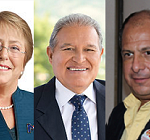In March, a new president took over in Chile and another was elected in El Salvador – both from the political left. In Costa Rica too, a new centre-left president assumed power, after the right-wing candidate withdrew his name from the final run-off in April.
In Chile, Michelle Bachelet became president for the second time on March 11. Her agenda includes lowering the cost of education, and constitutional and fiscal reforms. Shortly after she assumed power, on March 23, thousands of Chileans marched in a peaceful demonstration in Santiago to remind their president to deliver on her promise of educational reforms.
Bachelet’s foreign policy priorities include improving relations with neighbours and working toward better regional integration. Many of her policies are a shift from her right-wing predecessor, Sebatian Piñera, the outgoing president, who since 2010 reversed some of the policies that Bachelet introduced during her first term as president from 2006-2010. Now, she is expected to move closer to Brazil and Argentina, which are also ruled by leftist women presidents. She is also expected to strengthen relations with the Mercosur bloc.
Bachelet has announced that her first foreign visit will be to Argentina in mid-April. This is a change from Piñera’s policy: he focused on the Pacific Alliance, which is pro-free trade and right-leaning. Bachelet, along with her foreign minister Heraldo Muñoz, have toned down the ideological profile of the Pacific Alliance and its rivalry with Mercosur, and called for a convergence between the two groupings.
Expectedly, Bachelet has expressed support for the leftist Venezuelan government of Nicloas Maduro. This too is in contrast to Piñera, who was sympathetic to the anti-government protestors in Venezuela. For months now, Venezuelans are protesting against high inflation, rising violence, corruption, crime, electoral fraud, and other issues.
In a press statement on March 16, Bachelet has categorically said, referring to Venezuela, that no one has the right to use violence to overthrow a legitimately elected government. She expressed support for the decision taken by UNASUR (the South American union of 12 countries) to send a ministerial delegation to Caracas to mediate a peaceful resolution of the Venezuelan crisis. We can also expect Bachelet to resume her sympathetic and supportive approach to Cuba as well.
In El Salvador too, the leftist candidate Salvador Sanchez Ceren, a member of the ruling coalition, FMLN (Frente Farabundo Marti para la Liberacion Nacional), won the second round of the presidential election on March 9. He got 50.11 % of the votes, while his conservative rival Norman Quijano from the Arena (Alianza Republicana Nacionalista) Alliance got 49.89%. The margin between the winner and the loser was only 6364 votes, out of a total of three million votes.
Quijano, the ex-mayor of the capital San Salvador, challenged the result, alleging fraud and calling for a recount. The margin between Ceren and Quijano in the first round of elections on February 2 was 10%; this had narrowed to 0.22% in the second round on March 9. Quijano even asked the army to intervene and sought the support of outside powers such as the U.S. But El Salvador’s Supreme Electoral Tribunal has declared Ceren the winner. Ceren will formally assume the five-year term of president on June 1.
The 69 year-old Ceren is a former Marxist guerrilla, a commander during the civil war from 1979 to 1992. He joins the group of other Latin American ex-guerrilla leaders who are currently president: Uruguay’s Jose Mujica and Brazil’s Dilma Rousseff.
Ceren has said that he will lead an austere life, much like Uruguay’s Mujica, without the fanfare of the presidential mansion and other privileges. The right-wing opposition has portrayed him as a potential Chavez, who will polarise society. But Ceren, who was vice president in the outgoing government, has promised to continue the inclusive development policies of his predecessor Carlos Mauricio Funes, to tackle the high levels of inequality and poverty in the country.
In neighbouring Costa Rica, which in contrast has had the best governance in Central America, a centre-left president will soon take over. Luis Guillermo Solis, the centre-left candidate, and Johnny Araya of the centre-right ruling National Liberation party, were scheduled for a second round in April. But Solis led in the first round on February 2, and Araya decided to quit the race after polls showed him trailing behind Solis by more than 40%.
Solis is a relative newcomer to Costa Rican politics. His victory has shaken the traditional political establishment of the country, where the ruling party has also recently got tainted with corruption scandals. But without a legislative majority, Ceren is not expected to make any drastic changes in economic or foreign policies.
Ambassador Viswanathan is Distinguished Fellow, Latin America Studies, Gateway House. He is the former Indian Ambassador to Argentina, Uruguay, Paraguay and Venezuela, and Consul General in Sao Paulo.
This blog was exclusively written for Gateway House: Indian Council on Global Relations. You can read more exclusive content here.
For interview requests with the author, or for permission to republish, please contact outreach@gatewayhouse.in.
© Copyright 2014 Gateway House: Indian Council on Global Relations. All rights reserved. Any unauthorized copying or reproduction is strictly prohibited.


